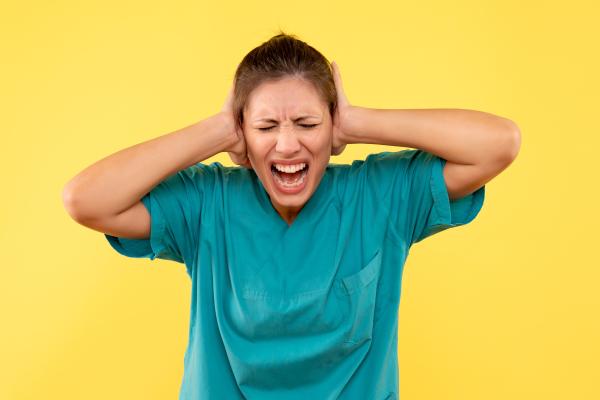Noise intolerance due to anxiety can manifest as excessive sensitivity to everyday sounds, causing emotional and physical discomfort. This reaction can trigger symptoms such as irritability, difficulty concentrating, and even panic attacks. Consequently, this significantly affects the quality of life of those experiencing anxiety.
Noise intolerance is one of the main reasons for consultation that represents thousands of people around the world. Being able to tolerate any type of noise makes any sound annoying, and everything seems strange. In this PsychologyFor article, we will provide you with information about the noise intolerance due to anxiety: causes, symptoms and treatment.
How is noise intolerance due to anxiety known?
On the one hand, noise intolerance due to anxiety can be known as misophonia. This term is used to describe an extreme aversion or negative response to certain sounds, which may be disproportionate to the actual sound level. In global terms, this problem can have different specific causes, anxiety being one of the most frequent today. In this article we explain what Misophonia consists of: what it is, symptoms, causes and treatment.
On the other hand, noise intolerance due to anxiety can also be called a hypersensitivity to sound. It consists of excessive or exaggerated sensitivity to everyday auditory stimuli that should not represent a health problem. However, the truth is that people who suffer from this diagnosis live with sadness and discomfort. This reaction may be a manifestation of underlying anxiety or stress.
Causes of noise intolerance due to anxiety
Noise intolerance due to anxiety can have multiple causes, which are often interconnected. The most relevant causes include:
- Anxiety disorders : Noise intolerance can be a symptom of anxiety disorders such as generalized anxiety disorder (GAD), panic disorder or post-traumatic stress disorder (PTSD).
- Sensory hypersensitivity : Some people have increased sensitivity to sensory stimuli, including sounds. This hypersensitivity may be biological or the result of previous experiences of trauma or stress.
- Trauma or past experiences : Traumatic noise-related experiences, such as car accidents, verbal abuse, or dangerous situations involving loud sounds, can lead to increased sensitivity or intolerance to noise later in life.
- Genetics : There is evidence that noise sensitivity may have a genetic component, meaning that some people may have an innate predisposition to be more sensitive to sounds. It should be noted that hearing is associated with damage caused to some neuronal receptors, and there are organic diseases that damage hearing ability and cause anxiety.

Symptoms of noise intolerance due to anxiety
Symptoms of noise intolerance due to anxiety can vary from person to person, but generally include a range of physical, emotional and cognitive responses. The most common are the following:
- physical discomfort : Headaches, muscle tension, excessive sweating, heart palpitations, shortness of breath, nausea or dizziness are experienced in response to sounds.
- Anxiety and nervousness : Feeling nervous, restless, or a general feeling of tension when faced with noisy situations.
- Irritability : Feelings of irritability or anger, especially if the sounds are perceived as annoying or intrusive. Here you will find more information about Irritability: what it is, causes, symptoms and how to control it.
- Avoidance of noisy social situations : tendency to avoid noisy places or situations where it is anticipated that there will be a lot of noise.
- Difficult to focus : Loud or distracting sounds can make it difficult to concentrate on important tasks or process information.
- emotional fatigue : Feelings of emotional exhaustion due to chronic stress caused by noise intolerance, i.e. a fluctuating mood.
- Excessive shocks : exaggerated responses or startles to sudden or unexpected sounds.
- Hypervigilance : Be constantly alert to sounds, even in environments where there is no real danger.
- Sleeping problems : Difficulty falling asleep or maintaining restful sleep due to sensitivity to noise.
- Social isolation : Noise intolerance can lead to avoiding social activities or social situations where a lot of noise is expected, which can affect personal relationships and overall quality of life. Discover the Consequences of social isolation in this article.
Even so, the isolated presence of any of these symptoms does not represent a condition of noise intolerance due to anxiety. In this sense, the diagnosis should always be made by a specialized mental health professional who has personalized information for each particular case.
Treatment of noise intolerance due to anxiety
The treatment of noise intolerance due to anxiety involves a combination of different therapeutic approaches. Here are some strategies that can help:
- Cognitive behavioral therapy (CBT) : CBT is a psychological therapy that focuses on identifying and changing patterns of thinking and behavior that cause anxiety. A therapist can work with you to identify irrational thoughts about noise and replace them with more realistic, healthy thoughts.
- Relaxation techniques : Regular practice of relaxation techniques helps relax both the body and the mind. Deep breathing, meditation, yoga or mindfulness can help reduce anxiety and sensitivity to noise.
- Gradual exposure : Gradually exposing yourself to noisy contexts can help you desensitize yourself to noise and reduce your anxiety in those situations. Start with short, low-intensity exposures, and gradually increase the duration and intensity as you feel more comfortable.
- Psychiatric medication : In severe cases, anti-anxiety medications can help reduce the intensity of symptoms due to noise intolerance due to anxiety. However, it is essential that their consumption be done under medical prescription. Here you will also find natural Anxiolytics to calm anxiety.

This article is merely informative, at PsychologyFor we do not have the power to make a diagnosis or recommend a treatment. We invite you to go to a psychologist to treat your particular case.
If you want to read more articles similar to Noise intolerance due to anxiety: causes, symptoms and treatment we recommend that you enter our Clinical Psychology category.
Bibliography
- Oyarzún, P., Neustadt, N., Morris, A., Gómez, G. (2022). Relationship between hyperacusis and central auditory processing disorder: A review of the literature. Journal of Otolaryngology and Head and Neck Surgery, 82 (1), 101-113.
- Tarnopolski, A., McLean, E. (1979). Noise as a mental health problem. Bulletin of the Pan American Sanitary Office, 87 (2), 163-167.









